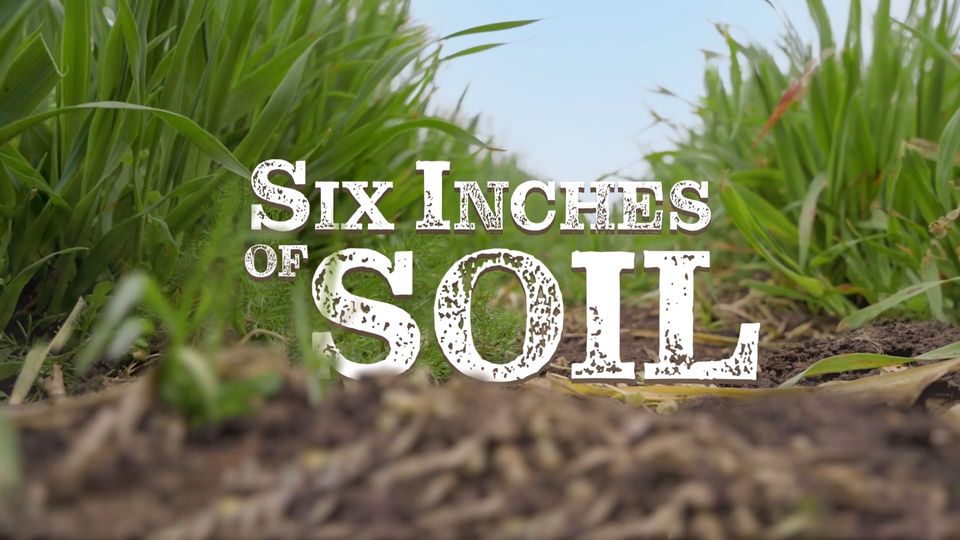The first feature length documentary film with an impact campaign to be made about regenerative farming and agroecology in the UK.
.
It’s clear we need to be looking after the soil on our farms – to nurture biodiversity, sequester carbon and regenerate the planet – but also for safe food security but particularly for flood protection.
The documentary Six Inches of Soil looks at just this – and is doing the rounds of independent cinemas and local groups – it’s promotional blub talking about “the inspiring story of British farmers standing up against the industrial food system and transforming the way they produce food – to heal the soil, benefit our health and provide for local communities.”
It was shortlisted for a Lush Spring Prize last year, as “the first feature length documentary film with an impact campaign to be made about regenerative farming and agroecology in the UK”.
And last last year it was launched, highlighting three British farmers standing up to the industrial food system:
It follows the stories of Anna Jackson, an 11th generation arable and sheep farmer from Lincolnshire; Adrienne Gordon, a small-scale vegetable farmer in Cambridgeshire; and Ben Thomas, a Cornwall-based cattle farmer who specialises in pasture-fed beef. The film documents their highs and lows over a one-year period as they embark on a regenerative journey, working to adopt sustainable practices while building viable businesses in an environment degraded by industrial agriculture.
The film is directed at the farming community, with the Farming Guardian last month providing a Q&A session for its producer, saying: “We want to get the public and the policymakers onside and to get farming the long term investment that it needs” | Farm News | Farmers Guardian
The film is also directed at the wider public, with the latest Marshwood Vale Magazine reviewing Six Inches of Soil:
Film producer Claire Mackenzie and director Colin Ramsay have released a film, Six Inches of Soil, which is doing a series of screenings at small venues around the country. It recently sold out for a screening at the Chapel in the Garden in Bridport. In an earlier film made by the same pair, featuring five Cambridgeshire farmers, farmer David White shows viewers the value that conservation agriculture has had on his life and his farmland. He shows the ‘staggering’ amount of worms in his now healthy soil and calls his worms his ‘workforce’ saying that they work for him ‘24 hours a day 7 days a week’. They work to restructure the soil, which he says means he doesn’t need a huge tractor and lots of cultivation equipment. The worms create an environment that allows root structures to thrive. He says his soil hasn’t been disturbed by more that an inch to an inch and a half in five to six years, allowing it to stay healthy. With the annual cost of soil degradation in England and Wales estimated to be in the region of £1.2bn, what David White calls his ‘conservation, no till farming style of farming’ is showing benefits that are starting to be appreciated nationally and internationally.
The joy of Six Inches of Soil is not it’s purveyance of doom and gloom, it is the fact that it’s focus is on a way forward. The three farmers featured in the film are looking at regenerative agricultural practices. ‘Regenerative agriculture is a suite of farming practices that rebuild soil, organic matter and restore biodiversity’ says the voiceover. ‘This is part of a growing movement of agro ecological farmers and food producers who are rejecting the industrial model. Choosing to work with nature, not against it.’ The sequence ends with the words. ‘Now is the time to reimagine our relationship with the soil, to recognize how it feeds us, protects us and sustains us. We need to hold the living soil in our hands and feel the earth beneath our feet once more.’
The film is also liberally scattered with comment from a range of experts including British activist and speaker Satish Kumar; Co-founder of the Leon restaurant chain, Henry Dimbleby; Professor Emeritus of Food Policy at City University of London, Tim Lang and Hannah Jones, farm carbon and soils adviser with the Farm Carbon Toolkit. There are many more voices also that offer observation and advice.
Finally, not everyone is enthusiastic, with a critique from George Monbiot in today’s Guardian, where he says: There’s no such thing as a benign beef farm – so beware the ‘eco-friendly’ new film straight out of a storybook.
…
